|
|
|
Sort Order |
|
|
|
Items / Page
|
|
|
|
|
|
|
| Srl | Item |
| 1 |
ID:
134356
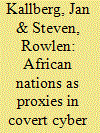

|
|
|
|
|
| Summary/Abstract |
The growth of the African Internet, and services related to the Internet, has been rapid over the last decade. Following this market expansion, a variety of service providers have started to provide access. A fast-growing market puts pressure on the providers to deliver services first and only then seek to secure the networks. Over time, industrialised nations have become more able to detect and trace cyber attacks against their networks. These tracking features are constantly developing and the precision in determining the origin of an attack is increasing. A state-sponsored cyber attacker, such as intelligence agencies and electronic warfare units, will seek to avoid detection, especially when the attacks are politically sensitive intelligence-gathering and intrusion forays into foreign states' networks. One way for the attacker to create a path that links the attacks and the originating country is by actions through a proxy. The less technologically mature developing nations offer an opportunity for cyber aggression due to their lower level of security under the quick expansion of the Internet-based market. Developing countries could be used as proxies, without their knowledge and consent, through the unauthorised usage of these countries' information systems in an attempt to attack a third country by a state-sponsored offensive cyber operation. If the purpose of the cyber attack is to destabilise a targeted society and the attack succeeds, the used proxies are likely to face consequences in their relations with foreign countries, even if the proxy was unaware of the covert activity.
|
|
|
|
|
|
|
|
|
|
|
|
|
|
|
|
| 2 |
ID:
134341
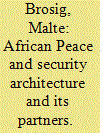

|
|
|
|
|
| Summary/Abstract |
This article presents survey data on the African Peace and Security Architecture (APSA). It focuses explicitly on two aspects: the internal constitution and achievements of the APSA; and coordination and cooperation with external actors, such as Regional Economic Communities, the United Nations and the European Union. The survey, conducted between October 2011 and December 2012, targeted 198 security experts in international organisations, think tanks, academia and non-governmental organisations. It reveals the APSA's current stage of development, achievements and challenges.
|
|
|
|
|
|
|
|
|
|
|
|
|
|
|
|
| 3 |
ID:
134340
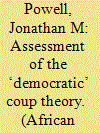

|
|
|
|
|
| Summary/Abstract |
The Egyptian military's unconstitutional removal of President Mohamed Morsi has reignited a debate regarding the theory of the ‘democratic coup’. Though coups are almost invariably condemned, many political observers and a few scholars have recently argued that coups can act as catalysts for democratisation. This paper empirically assesses the democratic coup hypothesis for Africa. Multivariate analyses from 1952 to 2012 suggest that coups statistically improve a country's democratisation prospects. Extensions of the model show that coups appear to be likely precursors for democratisation in staunchly authoritarian regimes and have become less likely to end democracy over time, and that their positive influence has strengthened since the end of the Cold War. As of 2012, countries that have experienced a recent coup are expected to be four times more likely to witness a democratic transition than those that have remained coup-free.
|
|
|
|
|
|
|
|
|
|
|
|
|
|
|
|
| 4 |
ID:
134354


|
|
|
|
|
| Summary/Abstract |
This paper employs functionalist, transformative and peacebuilding approaches to explore the role played by civil society in peacebuilding during Zimbabwe's coalition government (2009–2013), under the Church and Civil Society Forum (CCSF). Through the functions of democratisation, socialisation and the rebuilding of communities, the various bottom-up peacebuilding initiatives under the CCSF framework rebuilt broken relationships, provided spaces of encounter between victims and perpetrators, and bridged the paradoxical values of mercy, justice, truth and peace in a context of deep political polarisation. Although the various peacebuilding activities were scattered and sporadic, they do provide a basis for nationwide replication under a ZANU-PF dominated government. The new 2013 constitution provides institutional opportunities for the formulation of a broader national framework for peacebuilding that synergises these efforts by civil society and a politically willing state.
|
|
|
|
|
|
|
|
|
|
|
|
|
|
|
|
| 5 |
ID:
134342
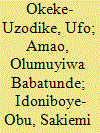

|
|
|
|
|
| Summary/Abstract |
This article interrogates the continuing relevance of the contractarian governance paradigm to resource governance and the impact of exploitation on the local population and environment in the Democratic Republic of Congo (DRC), Zimbabwe and Ghana. It highlights the susceptibilities of their governance processes, particularly the roles of the elites of the host communities, the multinational corporations, and the governing authorities in appropriating resources for their personal interests, resulting in tensions and conflicts. This scenario is borne out of inept leadership, as well as the defective and compromised administrative mechanisms operational in these countries. In view of this, the article underscores the need for a ‘new governance management paradigm’ anchored on a communitarian framework, which incorporates all stakeholders, to guarantee sustainable peace and prosperity, particularly in conflict zones. The article therefore concludes that achieving a nexus between forestry, mining activities and economic development in these countries will require a restructuring of the existing governance mechanisms; and advocates for a new governance model capable of curbing the excesses of local and foreign hegemony, including a total overhaul of the seemingly compromised supervising authority.
|
|
|
|
|
|
|
|
|
|
|
|
|
|
|
|
| 6 |
ID:
134357
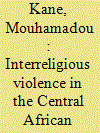

|
|
|
|
|
| Summary/Abstract |
The outbreak of violence following the insurgency by a coalition of armed groups called Séléka represents one of the darkest pages in the contemporary history of the Central African Republic (CAR). Although the country has experienced chronic instability since independence from France in 1960, it has never before descended into the current near-genocidal situation, which has pitted Muslims against Christians. The CAR has been embroiled in conflict since March 2013, with unprecedented security and humanitarian consequences. In December 2013, the United Nations representative for the first time described the situation as an alarming security threat and evoked the likelihood of genocide and humanitarian disaster if nothing is done.
|
|
|
|
|
|
|
|
|
|
|
|
|
|
|
|
| 7 |
ID:
134355
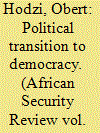

|
|
|
|
|
| Summary/Abstract |
This paper argues that the crisis of electoral democracy in Zimbabwe and Cote d'Ivoire is a result of underlying structural and institutional deficiencies within national and regional multinational institutions. It assesses the extent to which they have been ‘enablers’ or ‘spoilers’ of electoral-based transitions to democracy. Yet it avoids generalisations of the security sector's involvement in political transitions. In terms of structure, the paper is divided into four sections. Section one will briefly discuss the theoretical perspectives of the election-democracy trajectory. It argues that although elections are a major variable for democracy, unless the ‘ecology of elections’ is conducive, elections may not be an instrument of transition to democracy. The second section analyses the militarisation of politics and the role of the security sector in aiding or stalling democratisation. Section three will assess the role of regional organisations such as the Southern African Development Community, Economic Community of West African States and the African Union in electoral-based political transitions in Africa. Lastly, the paper will discuss how the security sector and multinational African institutions can aid political transitions to democracy in troubled African countries.
|
|
|
|
|
|
|
|
|
|
|
|
|
|
|
|
| 8 |
ID:
134353
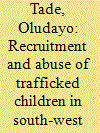

|
|
|
|
|
| Summary/Abstract |
This article examines the recruitment and transportation of internally trafficked children from Benue State in the north-central geo-political zone of Nigeria to Oyo State in the south-western zone of Nigeria. The study is essentially qualitative: with the aid of the snowball sampling technique, in-depth interviews (IDIs) were conducted with drivers, employers and trafficking agents in two recipient communities in Ibadan. The findings show that human rights abuses manifest at the recruitment, transportation and destination phases. The human rights abuses include the recruitment of underage children for domestic work outside their immediate family environments; transportation under inhumane conditions; restriction of movement at traffickers' ‘warehouses’; non-disclosure of amount payable for the services of domestic servants by agents/traffickers; exclusion of domestic servants in wage negotiations; and violence by employers. In view of these, there is a need for the National Agency for the Prohibition of Trafficking in Persons to strengthen its internal trafficking campaign.
|
|
|
|
|
|
|
|
|
|
|
|
|
|
|
|
| 9 |
ID:
134358


|
|
|
|
|
| Summary/Abstract |
This paper examines the downfall of the Séléka rebellion, which staged a coup in the Central African Republic in March 2013. The coup plunged the country into violence and chaos, and there has been an uneasy quest for peace ever since. This article explains why the leader of the rebellion lost control over his troops and was finally pushed by regional actors to leave power. The article concludes that the Séléka rebellion was already fragile and, together with the poor leadership demonstrated by the coalition leader, the rebellion was unable to hold on to power.
|
|
|
|
|
|
|
|
|
|
|
|
|
|
|
|
|
|
|
|
|